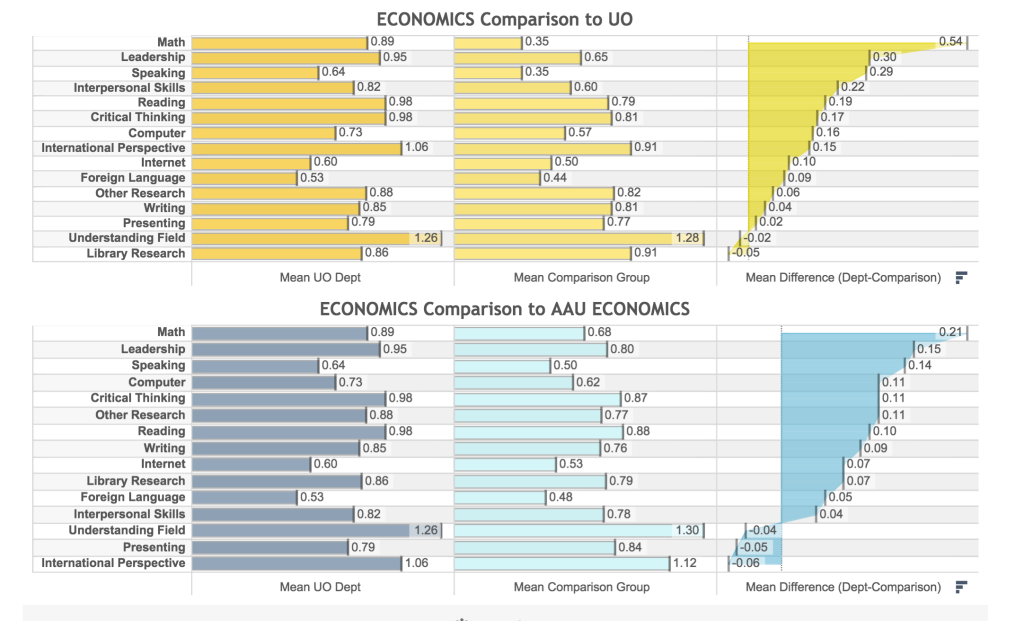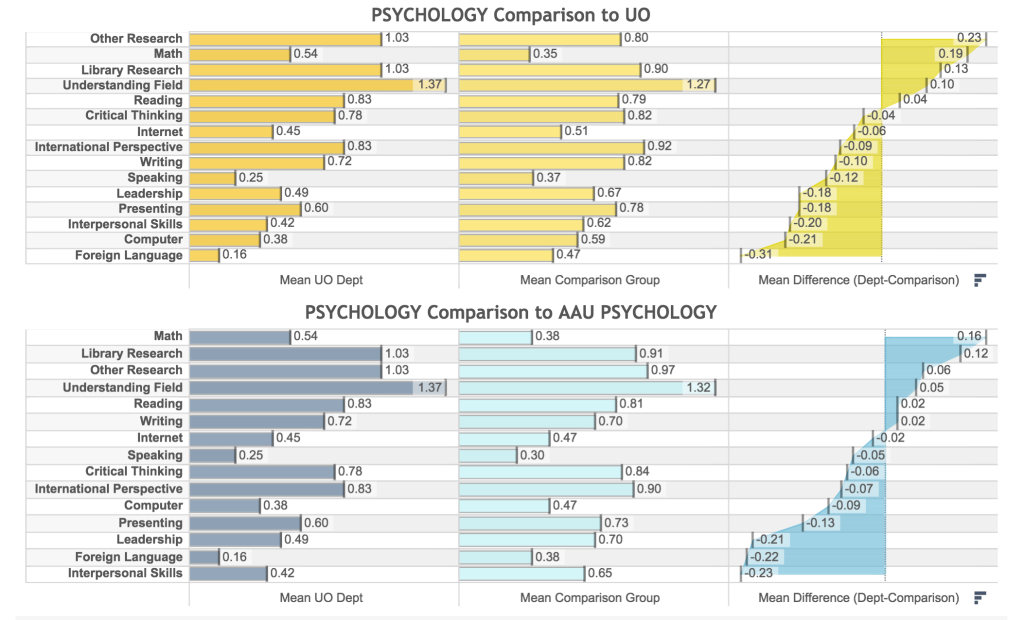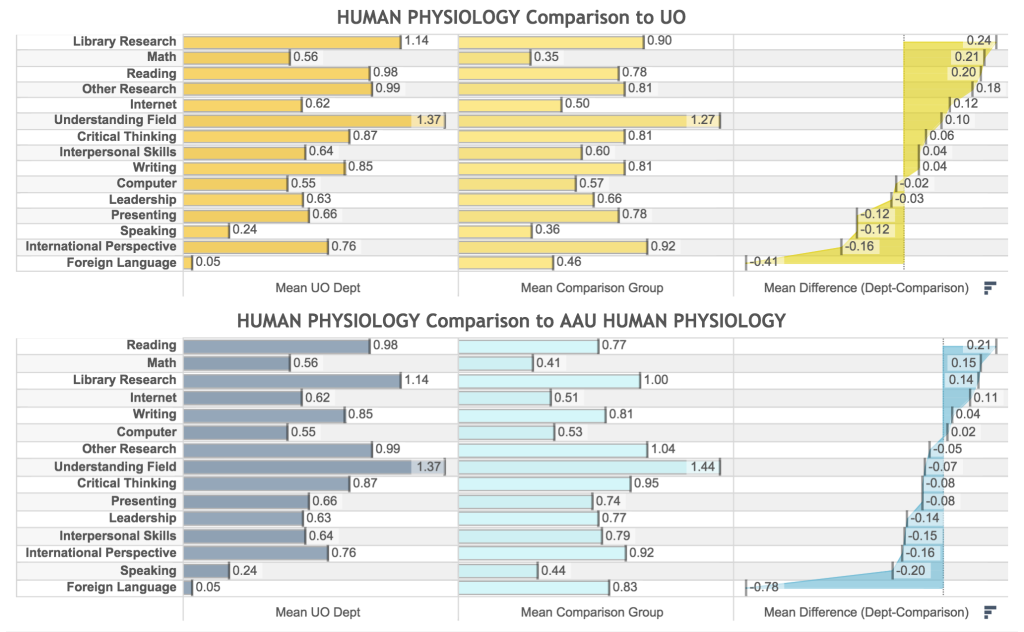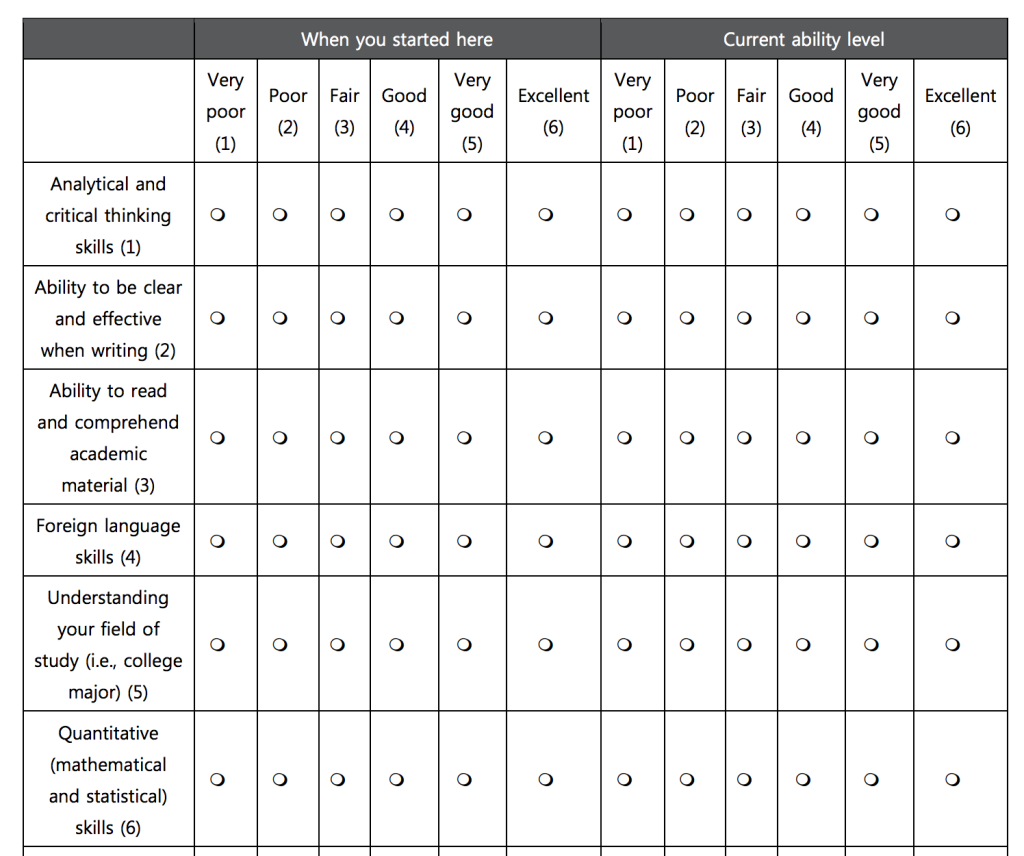A lot, in comparison to other UO majors and other AAU universities, according to the Student Experience in the Research University data on UO’s Institutional Research webpage here.
SERU is a project at UC-Berkeley which reports measures of the academic development of important skills such as mathematics, writing, and critical thinking. You can use UO’s IR website to generate mean-difference charts such as that below, comparing these skills before and after college, as a measure of what our students learn, or the academic “value added” of college.
You can even break this out by major, and compare what students learn from a given UO major to the value added by the average UO major. Many AAU universities are apparently participating, and the website even compares how much students learn from a UO major to what students learn from the same major at our AAU comparators.
To pick a major at random, here’s what students learn at the UO Economics Department. The bright yellow bars on the top right hand side show that the Economics Department teaches its students more than the average UO department on every dimension except Library Research. The bright blue bars on the bottom RHS show that Economics students learn more at UO than at the average AAU school by every measure but three:
I’m no economist, but given that UO pays its full professors of economics just 72% of the AAU comparator average, I think they call that efficiency.
Here’s the UO Psychology department:
Here’s another popular UO department, Human Physiology:
Before you do anything stupid with these data like brag to your colleagues, set UO budget priorities, or – god forbid – use them to advise a student what not to major in or whether to go to UO or MIT, it might be worth checking the fine print to see how SERU actually determines these pre and post measures of, say, mathematical ability. Those must be some interesting math problems.
I didn’t see a link on the IR website, but a little googling finds the questions here. It turns out students don’t have to answer any substantive questions at all. The SERU survey just asks students to assess their own knowledge now, and compare it with what they remember thinking they knew 4 years ago.
So maybe we should take the results above as proof that UO’s Econ department is unusually good at teaching our majors how to strategically game survey questions and boost the apparent value of their degrees?
Measuring what students learn in various majors and how that varies across universities is a really important goal, and I apologize to the people at SERU if they come across this post and see it as an attack. Their research reports include plenty of caveats about how to use and not use the data, and their approach is an interesting attempt to start looking at these issues. If anyone knows of other efforts, please post a comment.




Might there be selection bias as well?
I guess the story would be that students with high willingness or ability to learn math, leadership, etc and a low willingness to figure out libraries select into UO Economics rather than other UO majors, or economics at other universities. Seems plausible!
What about “Understanding Field”?
I’m not sure if you are being sarcastic, but “high willingness to learn math” and “low willingness to figure out libraries” is a fairly accurate description of every economist I know…
Your comment is defamation per se, and if I don’t receive a complete and utter retraction I will contact Attorney Bill Gary at Harrang, Long, Gary and Rudnick (sic) and ask him to send you a threatening letter.
I can’t speak for other economists, since the ALA ethics code has some strong language about the confidentiality of library circulation records, and while I’m no librarian I think it would be immoral to tell who has been reading pinko stuff like Piketty.
However, it is a well known fact that I have excellent library skills, and have checked a great deal of material out of the UO Library Archives. You can confirm this by getting a court to order the UO librarians to release my confidential circulation records, or just drop an email to Dean Adriene Lim. She apparently has no problem showing them around.
Hi Bill,
Roughly 60% of all my classes were taught by GTF’s, and that’s not including 201 and 202 (also taught by GTF’s). It’s just something to keep in mind. By your logic shouldn’t Professor pay be tied to Grad student performance? I’m in no way trying to deface the econ department (I donate money to the department whenever I can), I just wanted to point that fact out.
Good point, former student. Although you could argue that faculty already do (or at least should) get paid for grad student performance since it makes the whole department look better. Maybe we should pay Econ GTF’s more? We already pay them a lot more than the UO average, and when they graduate and get professor jobs, the best end up getting paid more than profs at UO. And thanks for the donations!
I completely agree the Econ faculty should be paid more, I wasn’t trying to dispute that. The best courses I had were all taught by professors; I unfortunately wasn’t able to take one of your courses. I graduated in 2011, just for a reference.
We do have probably the highest placement rate into tenure track jobs out of nearly any graduate program. And employment rate is essentially 100 percent. And we graduate nearly everyone within 5 years.
Will nobody point out a) that self-reported assessments of knowledge are worth about as much as any other self-reported statements and b) that this result could be taken to mean that UO students come to the university knowing less than their peers at other universities and thus have more to learn? and then THINK they’ve learned it?
After first being appalled that anyone could consider self-reported perceptions of changes in skills as being in anyway indicative of actual student learning, I looked at the SERU web page and report, and nowhere do they state that measuring student learning is an aim of their studies. It’s quite clearly intended to be a survey of perceptions of college experiences. It is completely absurd to use their data to compare departments, or to write that one can “break this out by major, and compare what students learn,” or to write that one can infer from this “How much … undergrads learn from a UO Economics degree.” One might argue that a survey about perceptions about learning is pointless. Sure, but that’s a separate issue. Deliberately framing the SERU data as being something it’s not is either sloppy or sleazy.
I was trying to make a similar point about the caveats about using these data at the bottom of the post, after sucking in my readers with some controversy, as works so well for FOX and the Donald. But apparently I didn’t do the caveats very clearly. So a little sleazy and a little sloppy. Sorry.
However, after I posted this I did spend a little time looking at the literature and I was very surprised to find that the student’s self-reported assessments of their pre-college math and writing ability actually do correlate with their SAT performance, r about 0.4. So maybe these data aren’t as useless as I’d thought.
Or maybe that correlation only holds because they’ve seen their SAT percentiles before they fill out the pre-college part of the survey, while they know nothing about whatever ability they’ve accumulated in college, because we’ve inflated their grades to the point there’s little information in them.
uomatters — hate to break the news — but you are no FOX News (which is getting more and more entertaining, and did a great job with the Republican debate) nor are you competition for The Donald! (Maybe you should aspire to The Dave.)
Yes, this is a ridiculous “analysis” coming from whoever is doing it at Berkeley. It might be nice to have some real data on “Is our students learning?” (Increasingly, an issue being raised about higher education.) But this doesn’t cut it.